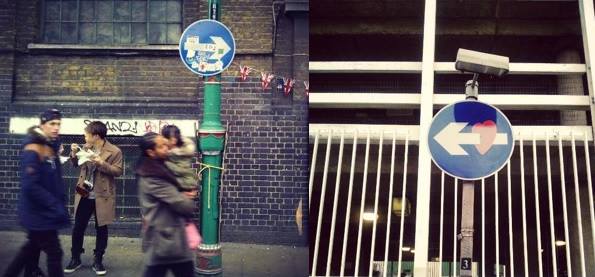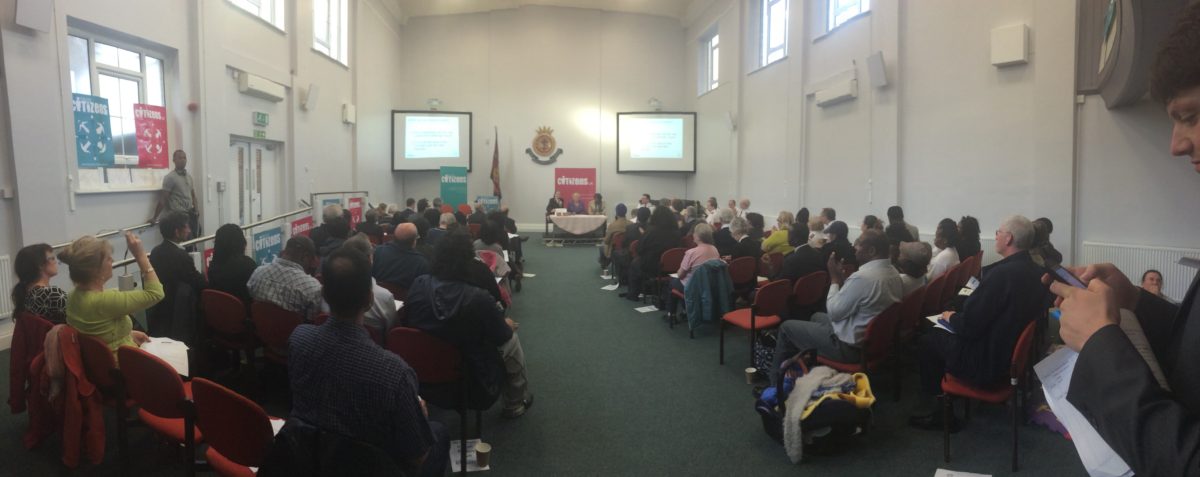Major Jonny Smith hosts a conversation on Facebook Live on 7 May 2020 with three Salvation Army corps leaders – Captain John Clifton (Ilford), Major Estelle Blake (Oldham Fitton Hill) and Major Nick Coke (Raynes Park). They explore themes related to mission, justice, community organising and the local church through stories of hope and transformation.
Category: Justice
Refugee Week 2019: Phoebe’s story – ‘Being an asylum seeker does not define me.’

By ‘Phoebe’
Four years I arrived at Heathrow Airport with my eight month old baby. We had travelled for six hours by plane and six hours to the airport from my home state in Nigeria. I had come to the UK to find safety after we had to leave our home because we weren’t safe there anymore and my family couldn’t keep us safe if we stayed in the country.
As we stepped into the airport I felt lost. I didn’t have anyone to meet me and I didn’t have much on me. I didn’t know how expensive life in the UK was. I tried to get a taxi but couldn’t believe how much they cost so tried to bargain about the cost. It’s funny now but it wasn’t then.
In the coming days I stayed with some relatives of my mum and I started the process of claiming asylum and found a lawyer to help me. But I couldn’t stay there because she was hearing bits of why I’d had to leave home and she wasn’t comfortable with us in the house. This was really hard. I didn’t know where else to go as she was the only person I knew in the UK. I felt so alone but I kept going because I have to be there for my child.
My lawyer called the Home Office and they said they couldn’t help us and I needed to go to the nearest police station. I was so scared. I thought they would arrest me or take my child away. But I had nowhere else to go. Eventually, they took us to a bed and breakfast in north London. When I got that room I was happy because at least it was a roof over our heads and a bed to sleep in. Everyone in the B&B was in temporary accommodation. This was the first place where I made friends and I’m still best friends with one of the ladies I met then.
My faith has always been important to me and so I quickly tried attending the local Catholic church, as I had been raised a Catholic back home. I invited a new lady in the B&B to come with me to church but people there weren’t really welcoming to her children and sent them away because of the children’s disability. I didn’t feel I could go back there after that and so tried the church across the road. This was The Salvation Army. It was a small church but it soon became our new home. The second Sunday we walked in and everyone greeted us by name. It meant such a lot. We were all alone and yet someone cared enough to remember our names. They hugged us. This was the first place that we actually felt welcome in the UK.
We stayed in that area for six months. Every two weeks I had to go to London Bridge to sign to prove I hadn’t disappeared undergound. Nobody could help me with the application for support from the National Asylum Support Service, known as NASS, so I was always in the library. This was hard. My child would be screaming and I would be trying to type my application as this was the only place I could do it. We were living on £20 a week from the council but half of this was going on the travel to sign at London Bridge. The health visitor helped me to get some food from the local food bank and another family in the B&B, who were slightly better off us, would share their food with us.
Eventually my application for NASS support was accepted and they provided us with some accommodation in another part of London and NASS subsistence allowance. Our accommodation is a single room for us to eat, play, study and sleep in. We have to negotiate with other families in the house for access to the shared kitchen, laundry and bathroom facilities. We receive a total of £72 a week to provide for all our other needs: food, clothing, medicine, travel, toiletries, study materials and phone bills. There is little left over to save for unexpected costs.
People at the corps told me there was a Salvation Army near to my new house but we kept going back despite the cost of travel because when you don’t have too many connections you don’t want to let go of good relationships when you don’t know where you’ll be next. I’d already had to leave my family and friends in Nigeria, I didn’t want to lose my new church famiy too.
Eventually one of the ladies told me she knew the officers in my new area so I decided to try the toddler group. I really liked it the first time I came because it was a big room and they didn’t have to turn people away like at so many of the children’s centre groups in the area. I got to know the people running the group and discovered it was a Salvation Army thing to be welcoming! So I started coming to the toddler group regularly. As the corps officer picked up a little about my situation she made it possible for me to attend the group for free. £2 doesn’t seem like a lot but when you only have a small amount to live on, it is. The corps also runs a Baby Bank, which helped me with clothes, toys and equipment for my child. They’ve also helped me with oyster costs to visit from solicitor, food parcels and clothing for myself, as well as a nursery deposit when my child was able to start nursery.
Eventually, I began attending the local corps on a Sunday too because now I had family here too. When my child was three I bought a birthday cake to church and wanted to celebrate with our family at church. I was just about to go and light the candles to bring it in when I turned round and saw that a friend had done it for me. It made me feel like I was at home, with my family who just help without being asked.
My first application for asylum was denied. I felt awful. I had hoped that soon everything would get better and now it seemed it would get worse. The Home Office said my case wasn’t strong enough and I should return to my country. My solicitors were able to appeal and my corps officer wrote a letter explaining her understanding of my situation. She also came with me so that she could look after my child while I went into courtroom. I didn’t want to leave my child behind with a babysitter because I was scared they would take me away and separate me from her. You can’t imagine how much it means to have someone safe to look after your child nearby when you’re attending court.
My appeal was denied. When I first got the letter I didn’t want to tell anyone because it hurt so much. I had been expecting to tell good news and then it was the opposite of what I was expecting. It broke my heart and I didn’t want to break other people’s heart. Over the past four years I have seen other people around me – my neighbours and my friends – receiving leave to remain and being able to move on with their lives. I am still waiting. I need to make a fresh application and have some new evidence to add but the task of starting again and looking for a new solicitor feels so daunting. I am tired of fighting. I am tired of waiting. I am tired of my dreams for me and my child being put on hold.
But I am a person of faith. Being an asylum seeker does not define me. Jesus Christ defines me. I am using this time to learn at college and develop skills for the future. I dream that when this is over, I can train as a midwife and care for women in their moments of pain.
I am an adherent member of the Salvation Army and sing in the worship group. I help in the Baby Bank and our charity shop, and am part of the team who make Messy Church happen. People at the corps see something in me that I can’t always see myself. They encourage me to use my gifts, even now while I am waiting.
The first time that I helped in the Baby Bank I was really happy – and quite jealous of the family worker who gets to do this for her job! I knew the process because we’d filled out the forms before. As the lady I met told me her story, I recognized so many things. She was living through the same experiences as us. I didn’t know there were other families like mine. I thought it was just us and I felt so happy that I was able to help her. We’re not the only ones. Before I felt like I was a problem person but I know now that there are so many people like me who are bravely living through difficult times because we trust that the UK is a safe place for people who have lost everything.
Phoebe is a member of a Salvation Army Corps in London.
Refugee Week 4: 3616 miles – making the journey from Tehran to Ellesmere Port
By Laurence Sandman (adapted and updated from a blog originally published on The Whole World Mobilizing, with permission)
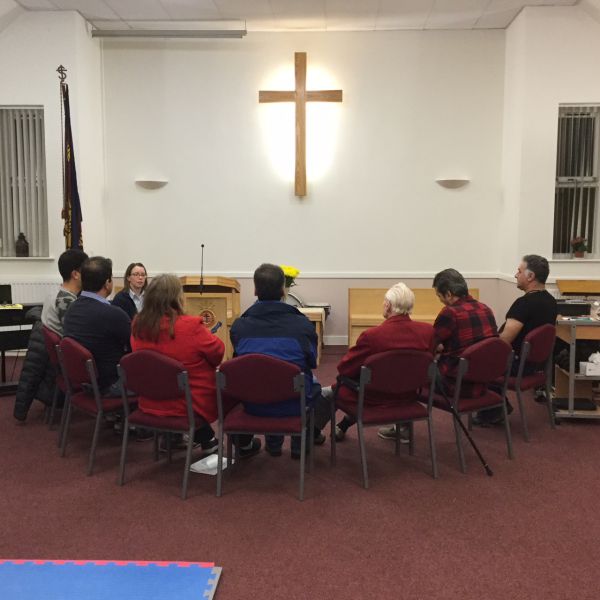 3616 miles. 5820 kilometres.
3616 miles. 5820 kilometres.
It’s a simple matter to type a departure point and a destination into Google and it tells me that it is 3616 miles or 5820 km and will take 61 hours by car. Easy.
Departure point: Tehran, Iran
Destination: The Salvation Army, Ellesmere Port, UK
Distance: 3616 miles / 5820 km
Duration of journey (by car): 61 hours.
Easy.
Easy?
As great and, I’m sure, as accurate as Google maps is, the figures don’t reflect the real world for real people. They certainly don’t even scratch the surface of the circumstances, the conditions and, above all, the emotional struggles of those who, as Christians and other faiths, find themselves in such desperate straits that a long, dangerous and uncertain journey seems the only way out.
Easy? Certainly not.
Continue reading “Refugee Week 4: 3616 miles – making the journey from Tehran to Ellesmere Port”
Refugee Week 2: ‘And they started to come…’ – welcoming refugees at Bootle Salvation Army
By Captain Annette Booth
 A year ago, I attended a meeting about asylum seeking in the UK and learnt that many people were being housed near me in the North-West of England by the Home Office. Individuals and families were placed in shared accommodation, most with little English language, whilst they awaited their asylum decisions.
A year ago, I attended a meeting about asylum seeking in the UK and learnt that many people were being housed near me in the North-West of England by the Home Office. Individuals and families were placed in shared accommodation, most with little English language, whilst they awaited their asylum decisions.
I asked what the best way was to make contact, and was told to knock on doors and ask people directly. I went home dismayed and began to pray that God would help these hidden people find their way to us, at The Salvation Army Corps in Bootle.
And they started to come….
The Times they are a-changin’
By Nick Coke
This article first appeared in the January-February 2017 edition of ‘The Officer’ magazine and is re-published with permission.
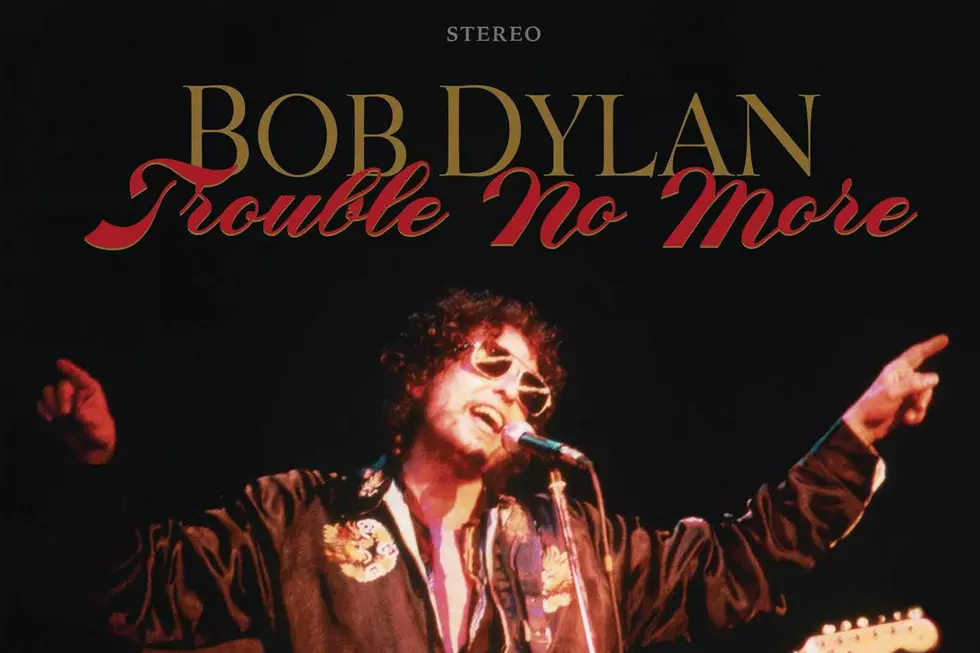
Bob Dylan is my hero. There, I’ve gone and said it! Some might laugh at the suggestion, others cringe and perhaps there are even those who wonder who on earth he is. Let me help you understand.
Bob Dylan is an American singer and songwriter, born Robert Zimmerman in Minnesota in 1941. Rising to prominence as a folk singer, he is accredited as a pioneer of the 1960s counterculture and the voice of a generation. His early songs accompanied the civil rights movement, and he even shared a stage with Martin Luther King on the day the Rev King delivered his ‘I have a dream’ speech in 1963.
Five Ways to Live Post-Brexit
by Nick Coke and John Clifton
Let’s get a few things straight from the outset.
One of us voted in, the other out. Neither of us are racist, nor are we members of a sneering elite. We’re not interested in blame, counter-blame or accusation. We agree on this: neither remaining in nor leaving the EU is the answer to all the questions that the people of the UK are asking.
We both live in London although we’re not from London. One of us grew up in the post-industrial north of England, the other in various countries around the world. We have both spent years investing in people at all levels of society because that’s what Salvation Army officers are called to do. We both love Jesus and try to follow him. We both love politics and get involved where we are.
Whilst we voted differently we share a vision of what’s next in a post-Brexit Britain. It is not theory. We know it works because we’ve done it, experienced it, seen people empowered by it, tasted God’s kingdom in it and seen communities changed by it. We describe it here as a picture of hope.
And, of course, hope is an action.
Justice rolling like a river: the fight for clean water in Kenya
Guest post by cadet Richard Bradbury
“But let justice roll down like waters, and righteousness like an ever flowing stream.”
Amos 5 : 24
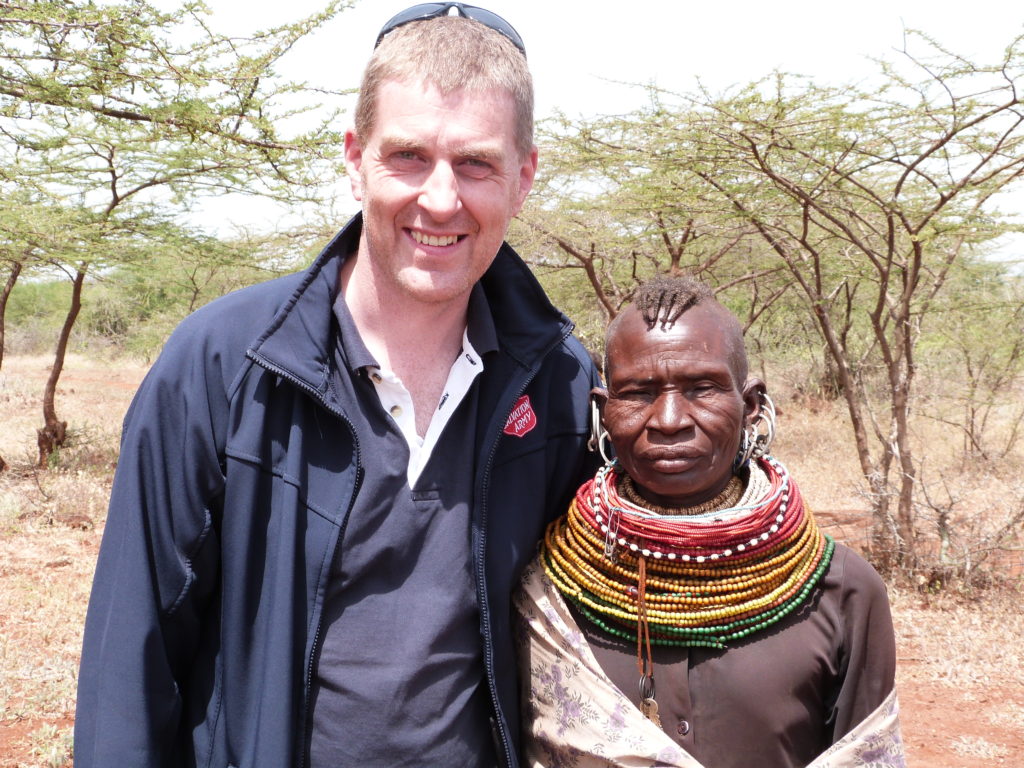
I know there is a much wider story here but it has always intrigued me why Amos chose water as a symbol of justice and righteousness. The back story to this commonly quoted verse in social justice spheres is quite clear but this reference is to water is fascinating. Israel appears to be a strong, prosperous people and doing all the things it is supposed to be doing, but God (and Amos) knows that this is just a big, fat front. Beneath the facade of their perceived faithfulness lays corruption, abuse, and greed. This brings wealth and power to some at the expense of others and this makes Amos really, really angry. He rebukes the Israelites strongly for their failure to keep the covenant, which is rooted in justice, and attacks their hypocrisy and their lack of compassion for others. And then he finishes his outburst by uniting justice and waters in the same sentence. They immediately become metaphorical and significant partners! Continue reading “Justice rolling like a river: the fight for clean water in Kenya”
Give, Teach, Train: how one Salvation Army Corps is organising for justice
This article first appeared in Explore Magazine 2016 and is published with permission.
A famous proverb says:
‘Give a man a fish and he’ll eat for a day. Teach a man to fish and he’ll eat for a lifetime.’
Recently, we’ve added a third part:
‘Train a man to organise and his community will feast for ever.’
However, in our part of London, the problem isn’t about having fish to eat – it’s about having a home to live in. Soon after Naomi and I arrived at Ilford Salvation Army, I met a man called Mustafa who had been an accountant. When I met him he had been on the street for a couple of days and came to us for help. What followed was a crash course in navigating bureaucracies. I met Mustafa at around 10 am. It was around 11 pm when I had to say to him: ‘I’m sorry, Mustafa. Here’s a sleeping bag. Come back in the morning.’
I had never felt so powerless in my life.
Power – which in community organising is defined as the ability to act – is the fundamental component of bringing about any sort of change you want to see. We could only make as much change as we had the power to compel.
Give a man a fish – Give a man a bed
People often come to Ilford Salvation Army because we are immediately next door to the council’s Housing Advice Centre. They come to us if they haven’t got the answer they wanted. Too often we can just give someone a sleeping bag and make a referral to set them on the path to finding appropriate support, as with Mustafa. After meeting him, however, in November 2011, we discovered a group of other Christians looking to establish a winter night shelter, following the deaths of two rough sleepers the previous year. Somewhere was needed to host the shelter, and with a large upstairs hall used only for storage, we offered our building as a venue.
Within weeks, 25 men and women were sleeping in sleeping bags on foam mats in our upstairs hall. Soup was served each evening and donations of clothing given out. It was basic, but it kept people alive. Over four winters, over 300 people have stayed at the night shelter. Each guest can tell their own story of the chain of events that led them to sleeping rough on the streets.
The shelter is only possible because of the commitment of over 150 volunteers from a wide range of backgrounds. Salvationists are joined by members of other churches: Catholics, Baptists, Pentecostals, Methodists and non- denominational. We are joined by people of other faiths and none. The current volunteer team includes Muslims, Sikhs, Jews, atheists and agnostics. We are a diverse community brought together to meet a common need. I’ve experienced more meaningful unity of the Body of Christ at the night shelter than I have in any other ecumenical setting.
Teach a man to fish – Help him find a home
A couple of years into the life of the night shelter, we realised that we shouldn’t just be giving people food and a bed. Lifesaving though this was, the night shelter needed to be a base for people to get their lives back on track and move on to a home of their own. We began convening a meeting between different local organisations to discuss what options there were for each person.
Unfortunately not everyone can move on. Last winter less than a fifth of our guests moved on to a more stable environment, whether rehab, hostel or flat. For some, their options are limited by having no recourse to public funds. For others, the obstacle is the lack of genuinely affordable housing in our borough. With the lowest stock of council housing of the London boroughs, people in Redbridge are dependent on private landlords. Rents are much higher than the local housing allowance, which means that people we have worked hard to build relationships with are moving out of the borough. This is true not just for people staying in the shelter, but also for families at our toddler group, and people who consider The Salvation Army their church. Suddenly, we all became aware that the housing crisis isn’t affecting just a niche group of homeless people. It is affecting our families and our friends. It is ripping the heart out of our community.
Train a man to organise – Building a community
Ilford Corps is a member institution of Redbridge Citizens, the local chapter of community organising alliance Citizens UK. Citizens UK is an alliance of over 350 schools, churches, mosques, synagogues, unions, youth groups and universities committed to social justice and the common good. Self-identifying as a ‘power organisation’, Citizens UK trains local institutions in the practice of community organising, so that with their neighbours they have the power to challenge politicians, councils and businesses. By building power, people can change their neighbourhoods, cities, and ultimately the country for the better. At Ilford Salvation Army, we realised we needed to get serious about organising if we were to make the change we wanted. The local elections of 2014 provided an opportunity to take action.
On Tuesday 6 May 2014, 93 citizens met at Ilford Salvation Army hall to hold a public negotiation with the three electoral candidates for leader of Redbridge Council. The three councillors were pressed by this diverse assembly to make commitments to pay a living wage to all care workers, create a private landlords register, explore the possibility of a Community Land Trust (CLT) in the borough, and to meet regularly with Redbridge Citizens to work together in addressing the issues raised at our assemblies.
A lot of hard work had gone into the assembly: negotiations with politicians; a script carefully crafted; conversation convincing members to turn up. This was just the beginning. We didn’t ask the politicians to do something for us; we asked them to do something with us. Months later, a small delegation met the newly elected Leader and Deputy Leader of the Council to follow up on their commitments, including exploring developing a community land trust (CLT).
A CLT is a way to develop genuinely affordable housing by taking the land into the shared ownership of the community. This removes the inflationary considerations of the land value from the cost of rent or purchase, meaning they can instead be linked to the median income of a given area. Stepney Salvation Army, through Citizens UK, had already been involved in pioneering the first urban CLT in the UK, and we believe that developing one within our borough will benefit local people struggling to find affordable places to live.
After months of public actions, we engaged with the borough’s Fairness Commission and succeeded in getting them to recommend that two parcels of land be allocated towards large-scale CLTs. In November 2015, we went to a council meeting at the town hall. We filled the public gallery with 80 of our members and stood together to table a question to seek the Leader of the Council’s endorsement of the CLT. He committed to attending another assembly in February 2016 where we would celebrate signing up 300 new shareholders of the CLT – the #Pound4Power campaign. The night shelter guests have all signed up as shareholders, and one of the guests at the night shelter has signed up nearly 60 new shareholders on her own!
Conclusion
Matthew 25:34-36 says: ‘Come, you that are blessed by my Father, inherit the kingdom prepared for you from the foundation of the world; for I was hungry and you gave me food, I was thirsty and you gave me something to drink, I was a stranger and you welcomed me, I was naked and you gave me clothing, I was sick and you took care of me, I was in prison and you visited me’ (NRSV)
A key aspect of these verses is that the situation is transformed. For example, the one who is hungry is fed. In other words, the homeless person gets a home – not homeless any more! What if we go a step further and recognise that one of the roots of each of these situations is the incapacity to act? Perhaps it’s also appropriate to say, ‘I had no power, but you trained me how to take it back’, so that there’s a fighting chance in that struggle ‘against the rulers, against the authorities, against the powers of this dark world and against the spiritual forces of evil in the heavenly realms’ (Ephesians 6:12 NIV).
My dream for Ilford Salvation Army is that it will not just be a community where lives are saved (though it is), where a community comes together to meet a common need (though it is) and where those sleeping rough come to realise that they are valued and loved by our community (though, again, it is) – but that it will be a place where people find the capacity to act – that power might be built.
Continue reading “Give, Teach, Train: how one Salvation Army Corps is organising for justice”
Just Life
This article first appeared in the Salvationist magazine and is published with permission.
By Nick Coke
I hear the same question all the time. Essentially it’s this: I know we should fight for social justice, but how do we actually do it?
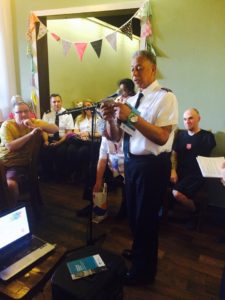 In terms of theological, devotional and motivational material urging us forward in the fight we have never had it so good. The biblical mandate for action is being preached with new fervour in the light of austerity, political upheaval and the refugee crisis. Resources are plentiful – campaign material regularly finds its way into our letterbox, email inbox and social media feeds. Dutifully we follow the instructions to pray, fundraise, get informed and click on the link to another petition website. Online activity in the cause of social change has led to the coining of a new word – ‘clicktivism’. Apparently we’re clicking like we’ve never clicked before. Yet beneath it all comes that nagging question – is any of this really making a difference? It all feels so detached. There’s surely more to justice-seeking than this.
In terms of theological, devotional and motivational material urging us forward in the fight we have never had it so good. The biblical mandate for action is being preached with new fervour in the light of austerity, political upheaval and the refugee crisis. Resources are plentiful – campaign material regularly finds its way into our letterbox, email inbox and social media feeds. Dutifully we follow the instructions to pray, fundraise, get informed and click on the link to another petition website. Online activity in the cause of social change has led to the coining of a new word – ‘clicktivism’. Apparently we’re clicking like we’ve never clicked before. Yet beneath it all comes that nagging question – is any of this really making a difference? It all feels so detached. There’s surely more to justice-seeking than this.
Ten years ago those nagging doubts started my journey towards a more active justice-seeking faith. What follows are four lessons I have learnt along the way. I share them with the hope they might provoke and encourage you a little.
LIVING A JUST LIFE
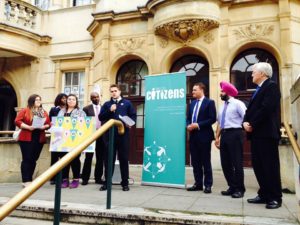 The beginning of justice-seeking is neither an action nor a programme. As an officer once reminded me: ‘We don’t do social justice – we live justly.’ In Salvation Army theology it springs from our holiness teaching, where the inner life of a believer, orientated around a relationship with God, spills over into public life. Faith may be personal but it’s never private. The inner working of our hearts is manifested in hundreds of actions and decisions we make every day. Living a just life begins with how we treat others, who we include, how we use our wealth and time. This applies to those closest to us, neighbours and work colleagues, our corps family and, by extension, the whole of humanity. The rather wonderful truth I’ve discovered is that the more I’ve chased personal holiness the more compelled I’ve been to seek a just world and the more justice-seeking I’ve engaged with the more convicted I’ve been about personal transformation.
The beginning of justice-seeking is neither an action nor a programme. As an officer once reminded me: ‘We don’t do social justice – we live justly.’ In Salvation Army theology it springs from our holiness teaching, where the inner life of a believer, orientated around a relationship with God, spills over into public life. Faith may be personal but it’s never private. The inner working of our hearts is manifested in hundreds of actions and decisions we make every day. Living a just life begins with how we treat others, who we include, how we use our wealth and time. This applies to those closest to us, neighbours and work colleagues, our corps family and, by extension, the whole of humanity. The rather wonderful truth I’ve discovered is that the more I’ve chased personal holiness the more compelled I’ve been to seek a just world and the more justice-seeking I’ve engaged with the more convicted I’ve been about personal transformation.
MOVING TO THE EDGES
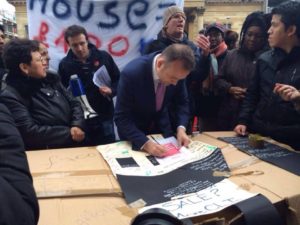 While justice begins with God, it clearly involves people. In the Exodus story the groans of the Israelite slaves rise up before God and initiate a social justice movement (Exodus 2:23–25). In today’s world we constantly hear the groans for ourselves – the low-paid worker at the food bank, the refugee, the homeless and the discriminated against. Most of us long to end such suffering. The uncomfortable truth, however, is that real justice-seeking compels us to move to the edges and experience first-hand the sufferings of others before we can act. There really is no other way. Of course when we get there we discover God is well ahead of us.
While justice begins with God, it clearly involves people. In the Exodus story the groans of the Israelite slaves rise up before God and initiate a social justice movement (Exodus 2:23–25). In today’s world we constantly hear the groans for ourselves – the low-paid worker at the food bank, the refugee, the homeless and the discriminated against. Most of us long to end such suffering. The uncomfortable truth, however, is that real justice-seeking compels us to move to the edges and experience first-hand the sufferings of others before we can act. There really is no other way. Of course when we get there we discover God is well ahead of us.
In justice-seeking circles I hear the phrase ‘being a voice for the voiceless’ over and over again. But true justice- seeking demands something more costly and sacrificial than speaking on someone’s behalf from a safe distance. Far better to stand with someone as they find a voice of their own. To sit with the homeless person who just got
evicted unfairly, to listen to the asylum seeker who was mistreated at the immigration centre, to turn up at the mosque that has just been daubed with anti-Muslim graffiti. When we personally connect with the issue then we really start to get stuck in.
FIGHTING THE GOOD FIGHT
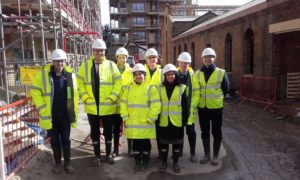 Once personally involved in the sufferings of others, it is tempting to offer charity and stop there. We meet the need, bandage the wound and move on. Most likely people will call us saints.
Once personally involved in the sufferings of others, it is tempting to offer charity and stop there. We meet the need, bandage the wound and move on. Most likely people will call us saints.
Justice-seeking, however, walks a different path as we seek to move beyond the sticking plaster to tackle the root cause. Careful analysis is required to unearth the issue, to research in detail the layers behind it and to identify those with power to change things. When working for change, moments will come when we face challenge. Earthly and spiritual powers will do their best to block our way. Disturbing the status quo or pointing out an injustice will not always make us friends. No longer will
everyone call us saints and some will consider us troublemakers. This is often where we begin to falter. We like to be popular. History, however, reminds us that justice is always, always a struggle. We must purposely and prayerfully push on.
POLITICS, BUT NOT AS YOU KNOW IT
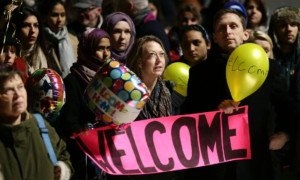 The final stage is to move from a protest voice on the margins into the corridors of power, where decisions are made. Forcing your way into this space can happen only when we organise ourselves to be powerful enough for decision-makers to take notice. This is the work of politics – not party politics – but community-based, people politics. And this is where corps and centres come into their own. After all, we know our communities and, in most cases, we have been a constant presence for generations. Almost every local expression is connecting directly with those who suffer injustice and, crucially, we are collectives who exist to transform the world! In a society where institutional
The final stage is to move from a protest voice on the margins into the corridors of power, where decisions are made. Forcing your way into this space can happen only when we organise ourselves to be powerful enough for decision-makers to take notice. This is the work of politics – not party politics – but community-based, people politics. And this is where corps and centres come into their own. After all, we know our communities and, in most cases, we have been a constant presence for generations. Almost every local expression is connecting directly with those who suffer injustice and, crucially, we are collectives who exist to transform the world! In a society where institutional
life is waning, it positions us in an extraordinary place to be justice- seekers.
When we look at our neighbourhoods we soon discover others who share our concerns for justice: faith organisations, schools, community groups. The work of building broad and powerful alliances of justice-seekers will position us around the table where we can speak truth to power and be heard.
The good news is that I hear stories of Salvationists increasingly joining in exactly this kind of grassroots justice- seeking and of powerful transformational results. My prayer is that we grasp the moment presented to us. May God bless us with his holy discomfort to live the just life.
I May Not Get There With You: The True Martin Luther King, Jr. by Michael Eric Dyson
Guest post by Tom Underwood
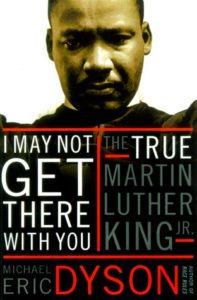 Whilst much has been written about the life and work of Martin Luther King Jr. this is a book that goes beyond autobiography to assess the legacy of King in America today.
Whilst much has been written about the life and work of Martin Luther King Jr. this is a book that goes beyond autobiography to assess the legacy of King in America today.
From the outset of the book Dyson makes clear his belief that King is “the greatest American who ever lived.” He then goes on to share three central mistakes people make in relation to King’s legacy; ideas, identity and image. Rather than a chronological guide to King’s life the book is then divided into these three core areas.
The chapters in the ‘ideas’ part of the book seek to reestablish the radical nature of King, particularly by exploring his changing beliefs in the last years of his life.
“King has been fashioned to calm rather than trouble the waters of social conscience in the post-civil rights era. But he was no Safe Negro.”
It is fascinating to read about the changing perspectives that caused him to speak out against the horrors of the Vietnam war and organise action against poverty. In his last years King had, “… a commitment to showing the lethal links between racism, militarism and poverty.” Martin Luther King is now honored with a national holiday in America so it is easy to forget that in the few years leading up to his death his views on Vietnam, black nationalism and poverty were making him increasingly less popular with whites and also meeting with opposition from within the African American civil rights movement.
The second part of the book deals with identity and chapters in this section directly address King’s plagiarism, the insatiable sexual appetite that led to multiple affairs and his patriarchal chauvinism. The writer Dyson met with criticism from some within the African American community for criticising King yet he counters that it is essential to connect with the humanity of King otherwise he becomes an unhelpful hero, someone who is so worshipped and adored that he becomes impossible to live up to and then alienating to young African American’s in America today.
Finally, the book deals with how King’s image’s is used today. I personally found this section of the book less interesting than the others as it moves away from King to cover his family’s wrestle for control over his image after his death.
If you’re looking for an autobiography on the life of King this is not going to be for you. However, if you know the history of King and want to read more in-depth this is an accessible academic study of his legacy.
As Christian activists it provides much helpful advice through the prism of King’s life. Most of all it challenges us today as it reminds us of the sacrifice involved in following God by pursuing justice. For thirteen years King lived in the spotlight of the civil rights movement with the constant fear of death, for King, “His most enduring trophies were the calluses he gathered from marching for justice in merciless heat and the sore knees he gained from bending to pray for enemies he defiantly loved.”
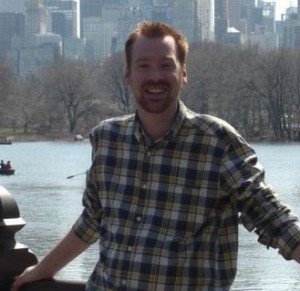 Tom Underwood teaches young people with autism and writes plays about peace. He is currently writing about peace activism and arms trade activists. He worships at Raynes Park Community Church and tweets @tomcunderwood
Tom Underwood teaches young people with autism and writes plays about peace. He is currently writing about peace activism and arms trade activists. He worships at Raynes Park Community Church and tweets @tomcunderwood

